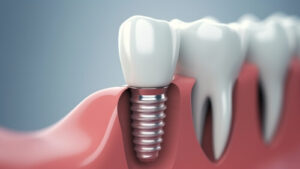In the quest for a flawless smile, false tooth and dental implant surgery stand out as a beacon of modern dentistry, offering individuals a chance to reclaim the functionality and aesthetics of their natural teeth. These marvels of dental technology not only enhance one’s appearance but also confer a newfound confidence in social and professional settings.
Dive into the world of false tooth implants with us as we explore every step, from your first consultation to the life-changing moment of your final implant placement. This journey is more than just a dental procedure; it’s a path to rediscovering your smile’s potential, where cutting-edge technology and personalised attention converge to craft a smile that’s not just aesthetically pleasing but resilient and enduring. Join us as we unravel the transformative effects of dental implants and how they can redefine how you live, laugh, and enjoy life to its fullest.
What are false teeth implants?
False teeth implants, commonly known as dental implants, are a state-of-the-art restorative dental solution designed to replace missing teeth. These implants consist of titanium posts surgically inserted into the jawbone, acting as artificial roots. Onto these posts, custom-made crowns that resemble natural teeth are securely attached.
Unlike traditional dentures, false teeth implants offer a permanent and stable solution, allowing for improved chewing function and speech, as well as maintaining facial and jaw bone structure by preventing bone loss. They are a popular choice for those seeking a durable and lifelike replacement for lost teeth.
False teeth options
Exploring the realm of false teeth options presents individuals with missing or damaged teeth with various pathways to restore their smile and functionality. These alternatives cater to diverse needs, preferences, and oral health conditions. Let’s delve into the primary options available:
- Removable Dentures: Traditional dentures are the most common form of false teeth. They can be full or partial, replacing all the teeth or just a few. Dentures rest on the gum line and can be removed for cleaning.
- Fixed Bridges: A dental bridge is a permanent fixture of a false tooth anchored by adjacent healthy teeth or implants. It’s a suitable option for those with one or more missing teeth who prefer a non-removable solution.
- Implant-Supported Dentures: Combining the stability of implants with the coverage of dentures, this option involves attaching a full arch of false teeth to a few strategically placed implants. It offers improved stability compared to traditional dentures.
- Single Dental Implants: For individual missing teeth, a single dental implant provides a permanent and natural-looking replacement. It consists of an artificial tooth root topped with a crown.
- Custom Dentures: Step into the world of personalised dental care with custom dentures, where each set is a unique creation moulded from the precise contours of your mouth. This bespoke approach ensures a snug fit and a seamless, natural look, enhancing not just your smile but also your comfort.
- Immediate Dentures: In the aftermath of tooth extraction, immediate dentures stand ready to fill the void. They act as a provisional yet full dental set, offering the aesthetic and functional benefits of a complete smile during the healing process, paving the way for a more permanent solution.
As we delve deeper into these false teeth options, we’ll weigh the factors at play – the financial commitment, the daily upkeep, and how they measure up against the backdrop of your unique bone structure and dental health. For instance, while removable dentures are generally more budget-friendly, they may require more maintenance and can be less stable than fixed options. On the other hand, one or more teeth in dental implants offer a permanent solution with a feel and function closer to natural teeth but require sufficient bone density and a higher initial investment.
Individuals need to consult with their dental professional to discuss these options. A dentist can provide a customised dental treatment and plan that aligns with the patient’s specific dental needs, lifestyle, and budget, ensuring the chosen false teeth option enhances their quality of life and oral health.
Which is better, false teeth or implants?
When faced with the pivotal decision of replacing missing teeth, the crossroads between opting for false teeth, such as dentures, and choosing dental implants is of personal significance. This choice is not merely a matter of preference but a complex decision influenced by a tapestry of factors unique to each individual. Oral health status, financial constraints, and personal comfort levels are critical in steering this decision. As we explore the merits and considerations of each path, it becomes clear that the journey to restoration is as individual as the smiles we seek to reclaim.
False Teeth (Dentures):
- Cost-Effective: Dentures are generally less expensive upfront compared to implants.
- Non-Invasive: The process of getting dentures is non-surgical, which can be a deciding factor for those opposed to invasive procedures.
- Quicker Solution: Dentures can be created and fitted in a shorter time frame, offering a quick solution to missing teeth.
Dental Implants:
- Longevity: Implants can last a lifetime with proper care, making them a more permanent solution.
- Bone Health: Implants help preserve jawbone health by providing stimulation previously offered by natural tooth roots.
- Functionality: They offer stability that closely mimics natural teeth, allowing for greater comfort and efficiency in eating and speaking.
In the debate surrounding teeth, of false teeth versus implants, dental implants are often considered superior due to their durability and functionality. They can prevent the jawbone loss often accompanying missing teeth, thus maintaining the facial structure. Moreover, implants do not require the same level of daily maintenance as dentures and do not carry the risk of slipping or causing speech impediments.
However, the choice could be clearer-cut for everyone. Dentures may be the better option for individuals looking for a less costly solution or for those whose jawbones are not suitable for implants without significant grafting procedures. Additionally, the process of getting implants is lengthier and requires a period of healing that some may wish to avoid.
Ultimately, the decision between false teeth and implants should be made in consultation with a dental professional who can assess the unique needs and health of the patient’s mouth. It is a personal decision that balances the practicalities of cost and convenience with the desire for comfort, appearance, and long-term oral health.
Types of dental implants
Dental implants represent a sophisticated and highly effective solution for replacing missing teeth, offering stability and a natural appearance that is difficult to achieve with other dental treatments. In the realm of implant dentistry, several dental implants cater to various needs and conditions of oral health. Here’s an overview of the primary categories of dental implant treatment:
Endosteal Implants:
- Most Common Type: These are the most widely used dental implants, typically made of titanium and shaped like small screws.
- Directly in Bone: They are placed directly into the jawbone, serving as an artificial tooth root upon which an artificial tooth (or teeth) can be mounted.
- Requires Healthy Jawbone: Patients need sufficient bone density to support the implant, and bone grafting may be necessary if the jawbone isn’t thick enough.
Subperiosteal Implants:
- Alternative to Endosteal: These implants rest on the jawbone but under the gum tissue, used when the patient does not have enough bone for an endosteal implant.
- Metal Framework: A metal frame is fitted under the gum with a post attached to it, and the gum heals around the frame to hold it in place.
All-on-4® Implants:
- Full Arch Replacement: Designed for patients who need to replace all the teeth in one or both jaws.
- Fewer Implants Needed: This technique uses only four implants to support a full arch of artificial teeth, making it less invasive and often more cost-effective.
Mini Dental Implants (MDIs):
- Smaller in Size: These are narrower than traditional implants and are often used for patients with significant bone loss.
- Less Invasive Procedure: MDIs can often be placed without extensive surgery and are sometimes used to stabilise lower dentures.
Implant-Supported Bridges:
- For Multiple Missing Teeth: When more than one tooth is missing, implant-supported bridges can be used without the need to grind down adjacent healthy teeth, as is the case with traditional dental bridges.
Implant-Supported Dentures:
- Stability for Dentures: These provide greater stability than removable dentures, as they are anchored securely to implants placed in the jawbone.
Each type of dental implant offers a different approach to tooth replacement, and the best option will depend on the individual’s dental health, the extent of tooth loss, and the jawbone’s condition. A detailed examination and a customised treatment plan developed in consultation with a dental professional are essential to determine the most suitable type of dental implant for any given patient. The goal of implant treatment is to restore both function and aesthetics in a way that mimics the patient’s natural teeth as closely as possible, ensuring comfort, confidence, and long-term dental health.
Dental implant procedure
The dental implant procedure is a meticulous process that offers a long-term solution for replacing missing teeth, restoring both function and aesthetics to a patient’s smile. This multi-step treatment begins with a comprehensive evaluation, where a dental professional assesses the patient’s oral health, bone density, missing tooth amount, and suitability for implants. Here’s an outline of the procedure:
- Assessment and Planning: Initially, the dentist conducts a thorough examination, which may include X-rays or 3D imaging, to gauge the health of the jawbone and surrounding tissues. A detailed treatment plan is then developed, tailored to the patient’s needs.
- Tooth Extraction (if necessary): If a damaged tooth is present, it must be carefully extracted to make way for the implant.
- Bone Grafting (if required): Patients with insufficient bone density may require a bone graft. This process involves augmenting the jawbone to provide a solid foundation for the implant.
- Implant Placement: During the surgical procedure, the dentist places the titanium implant post into the jawbone. This post will serve as the new tooth root.
- Healing and Osseointegration: After placement, a period of healing is necessary, typically several months, during which the implant fuses with the jawbone—a process known as osseointegration.
- Abutment Attachment: Once osseointegration is complete, an abutment is fixed onto the implant. This component will hold the artificial tooth.
- Custom Crown Creation: Impressions of the patient’s mouth are taken to create a custom crown that matches the colour, shape, and size of the natural teeth.
- Crown Fitting: Finally, the custom crown is attached to the abutment, completing the restoration.
Throughout the procedure, patient comfort is a priority, with local anaesthesia or sedation options available to minimise discomfort. Post-operative care instructions are provided to ensure proper healing and to maximise the longevity of the dental implants. Regular dental check-ups are essential to monitor dental implant costs and oral health. With proper care, dental implants can provide a durable and effective solution for missing teeth, significantly enhancing the patient’s quality of life.
How long does a fake tooth implant last?
A fake tooth implant, when properly placed and cared for, can last a lifetime. The success of a dental implant largely depends on diligent oral hygiene and regular dental check-ups.
The implant, made of titanium, can remain in the jawbone indefinitely. In contrast, the crown atop the implant typically lasts 10 to 15 years before it may require replacement due to wear and tear. Factors such as the patient’s lifestyle, overall health, gum disease, and the location of the implant in the mouth can also influence the longevity of a fake tooth implant.
Conclusion
In wrapping up, the journey towards a complete and confident smile often leads many to consider false tooth implants. These marvels of dental technology stand as a testament to modern dentistry’s ability to restore not just the aesthetics but also the full function of natural teeth. With the potential to last a lifetime, implants offer a permanent solution to tooth loss, allowing individuals to eat, speak, and smile easily.
The success of these replacement tooth implants lies in the hands of the dental professionals and the patients through careful planning, skilled execution, and dedicated aftercare. If you’re contemplating this life-changing procedure, remember that the road to a brighter smile with false tooth implants begins with a single step: a consultation with your dental specialist.
If you’re ready to take the next step towards a dazzling and functional smile with false teeth implants, don’t hesitate to reach out. Call us today at (02) 8294 5812 to schedule your appointment with Digital Dental Surgery Sydney. Our team of experts is on hand to guide you through every stage of the process, ensuring you receive the highest standard of dental care. Your journey to a flawless smile is just a phone call away!
References
Dental implant surgery – Mayo Clinic
https://www.mayoclinic.org/tests-procedures/dental-implant-surgery/about/pac-20384622
Dental treatments – NHS
https://www.nhs.uk/live-well/healthy-teeth-and-gums/dental-treatments/
Dental Implants: What You Should Know | FDA
https://www.fda.gov/medical-devices/dental-devices/dental-implants-what-you-should-know
Implant Supported Dentures: Process, Benefits & Care
https://my.clevelandclinic.org/health/treatments/24303-implant-supported-dentures
False Teeth: Costs, Cleaning, Alternative, and Pictures
https://www.healthline.com/health/false-teeth








